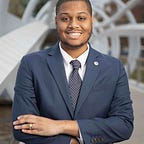Behind the Scenes of a Speaker’s Dreams: A Brief Look Into Speechwriters Who Supported Rev. Dr. Martin Luther King Jr.
The eloquence of the words captivated audiences across the nation. From “I Have A Dream” to “I’ve Been to the Mountaintop”, the oratorical magnificence of Rev. Dr. Martin Luther King Jr has never been questioned. While many have digested, analyzed, and debated the various speeches given by Dr. King, many have neglected to mention that there were a variety of speechwriters who edited, reviewed, and drafted speeches and remarks for Dr. King. In the process of giving speeches, the principal (Dr. King) has the final say, and at the end of the day, he will say what he sees fit. However, speechwriters have a unique sphere of influence to support and frame the messages that are later delivered by the principal. On the first celebration of Dr. King this decade, I decided I wanted to provide a brief look into some individuals who supported Dr. King as a speechwriter in any capacity during his time as trailblazing Leader, Activist, & Orator.
So far I’ve come across seven individuals who have been historically documented as a speechwriter for Dr. King at least once. The individuals I’ve come across so far are:
- Ed Clayton
- Alfred A. Duckett
- Junius Griffin
- Vincent Harding
- Clarence B. Jones
- Samuel Dewitt Proctor
- Bayard Rustin
These 7 individuals all served as Senior Advisors and it is fascinating to know that members of this group at one time or another helped draft or review speeches for Dr. King. I’m going to highlight four of these individuals in this piece to give a bit of insight on the work that is necessary to create impactful speeches.
Ed Clayton is documented as serving as a speechwriter for Dr. King in the early 1960s. During this time, Mr. Clayton had the opportunity to pen a biography about the life of Dr. King titled, “Martin Luther King: The Peaceful Warrior”. The biography was published in 1964 as a means to highlight the civil rights work that Dr. King was accomplishing throughout the country and produced in an easy to read manner for middle school aged children.
Alfred A. Duckett was an author who provided support to Dr. King on the “I Have A Dream” speech, and worked with Dr. King on his book, “Why We Can’t Wait” and assisted Dr. King with writing his weekly newspaper column titled “My Dream”.
Junius Griffin led Public Relations for the Southern Christian Leadership Conference (SCLC) and worked as Dr. King’s speechwriter during his time with the SCLC. Mr. Griffin would travel across the country with Dr. King assisting with the preparation of remarks and any Public Relations work.
Vincent Harding was a close friend and Senior Advisor for Dr. King. Dr. Harding is known for her assistance in helping Dr. King draft the “A Time to Break Silence”, a speech that articulated an anti-war vision against the War in Vietnam that America was waging and encouraging a pivot to America focusing on Social Justice.
When it comes to immaculate speeches, it takes a team to review and build the final touches on paper, and a captivating orator to deliver the words produced. Rev. Dr. Martin Luther King Jr. had an top notch team and was an amazing orator whose words continue to impact, influence, and live on to this day. On this day of reflection in our new decade, lets remember the power and beauty that can come from the speeches.
